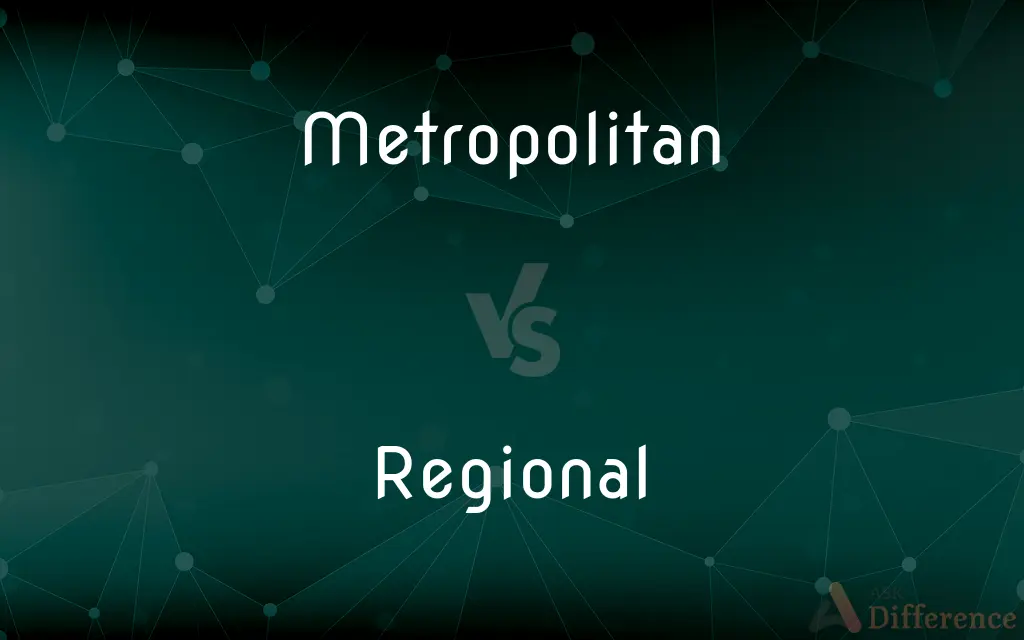Metropolitan vs. Regional — What's the Difference?
Edited by Tayyaba Rehman — By Maham Liaqat — Updated on May 13, 2024
Metropolitan refers to large urban areas with high population densities and extensive infrastructures, whereas regional encompasses broader areas that can include multiple urban, suburban, or rural zones.

Difference Between Metropolitan and Regional
Table of Contents
ADVERTISEMENT
Key Differences
Metropolitan areas are typically centered around a large city, serving as economic and cultural hubs with significant influence on surrounding regions. In contrast, regional areas can be defined by geographical, administrative, or economic criteria and cover a wider spectrum of environments including cities, towns, and rural landscapes.
The focus of metropolitan areas is often on providing urban amenities, such as public transportation, high-rise buildings, and cultural institutions, while regional areas might emphasize a mix of urban development, natural landscapes, and agricultural zones.
Metropolitan areas usually attract a diverse population seeking employment, education, and lifestyle opportunities provided by the city, whereas regional areas might appeal more to those looking for a balance of urban and rural benefits or who are involved in industries like agriculture or manufacturing.
In terms of governance, metropolitan areas may have a centralized authority managing various services and infrastructure, aiming for efficiency in densely populated urban settings; on the other hand, regional governance can involve multiple local governments collaborating across a wider area with more varied interests and needs.
While metropolitan areas are often seen as engines of economic growth, concentrating wealth and resources, regional areas can be characterized by a more distributed model of economic activities, often with significant contributions from sectors like tourism, agriculture, or natural resources.
ADVERTISEMENT
Comparison Chart
Definition
Urban areas centered around large cities
Areas encompassing urban, suburban, and rural zones
Focus
Urban amenities and infrastructure
Mix of urban development and natural landscapes
Population
High density, diverse demographics
Varied, often less dense than metropolitan
Economic Influence
High, with concentration in services and industry
Distributed, often including agriculture and tourism
Governance
Centralized urban management
Multiple local authorities with varied interests
Compare with Definitions
Metropolitan
Central to a region's economic, cultural, and educational activities.
The metropolitan museum is a cultural hub.
Regional
Encompassing several urban, suburban, and rural areas.
Regional development plans include improving infrastructure in rural districts.
Metropolitan
Pertaining to a major city and its surrounding areas.
The metropolitan area includes the city and the commuter towns around it.
Regional
Focused on integrating various local interests and needs.
The regional government coordinates policies that benefit both urban and rural populations.
Metropolitan
Attracting a diverse, often cosmopolitan population.
The metropolitan area's diversity is reflected in its various ethnic neighborhoods.
Regional
Often associated with local governance and decentralized administration.
Regional authorities are planning a series of local festivals.
Metropolitan
Characterized by high population density and urban infrastructure.
Metropolitan regions are known for their skyscrapers and busy streets.
Regional
Of or relating to a large geographic region.
Metropolitan
Of, relating to, or characteristic of a major city
Crowded metropolitan streets.
A metropolitan newspaper.
Regional
Of or relating to a particular region or district.
Metropolitan
Of or constituting a large city or urbanized area, including adjacent suburbs and towns
The Dallas-Fort Worth metropolitan area.
A metropolitan county.
Regional
Of or affecting a region of the body
Regional pain.
Metropolitan
Of, relating to, or constituting the home territory of an imperial or colonial state.
Regional
Of or characteristic of a form of a language that is distributed in identifiable geographic areas and differs in pronunciation, grammar, or vocabulary from the standard form.
Metropolitan
Of or relating to an ecclesiastical metropolitan.
Regional
Something, such as a magazine or a company branch, that serves a region
"earlier attempts to launch glossy regionals for women" (Business Week).
Metropolitan
A citizen of a metropolis, especially one who displays urbane characteristics, attitudes, and values.
Regional
Of, or pertaining to, a specific region or district.
Metropolitan
In the Western Christian churches, a bishop with provincial powers, with some authority over suffragan bishops.
Regional
Of, or pertaining to, a large geographic region.
Metropolitan
In most Eastern Orthodox churches, a bishop who is head of an ecclesiastical province and ranks next below the patriarch.
Regional
Of, or pertaining to, one part of the body.
Metropolitan
In the Greek Orthodox church, a bishop ranking next below an archbishop.
Regional
(Australia) Of a state or other geographic area, those parts which are not metropolitan, but are somewhat densely populated and usually contain a number of significant towns.
Metropolitan
(Orthodox Christianity) A bishop empowered to oversee other bishops; an archbishop.
Regional
An entity or event with scope limited to a single region.
Metropolitan
The inhabitant of a metropolis.
Regional
Of or pertaining to a particular region; sectional.
Metropolitan
(Orthodox Christianity) Pertaining to the see or province of a metropolitan.
Regional
Characteristic of a region;
Regional flora
Metropolitan
Of, or pertaining to, a metropolis or other large urban settlement.
Regional
Related or limited to a particular region;
A regional dialect
Metropolitan
Of or pertaining to the parent state of a colony or territory, or the home country, e.g. metropolitan France
Regional
Pertaining to or characteristic of a broad geographic area.
The regional climate varies significantly from the coast to the hinterlands.
Metropolitan
Of or pertaining to the capital or principal city of a country; as, metropolitan luxury.
Regional
Can imply a focus on specific sectors like agriculture or tourism.
The regional economy is heavily dependent on tourism and farming.
Metropolitan
Of, pertaining to, or designating, a metropolitan or the presiding bishop of a country or province, his office, or his dignity; as, metropolitan authority.
Metropolitan
The superior or presiding bishop of a country or province.
Metropolitan
An archbishop.
Metropolitan
A bishop whose see is a civil metropolis. His rank is intermediate between that of an archbishop and a patriarch; as, the metropolitan of Constantinople.
Metropolitan
In the Eastern Orthodox Church this title is given to a position between bishop and patriarch; equivalent to archbishop in western Christianity
Metropolitan
A person who lives in a metropolis
Metropolitan
Relating to or characteristic of a metropolis;
Metropolitan area
Metropolitan
Governed typically by a single metropolitan authority.
The metropolitan council implemented new public transportation policies.
Common Curiosities
What is a metropolitan area?
A metropolitan area is an urban region that includes a central city and its surrounding suburbs, characterized by high population density and integrated economic activities.
What economic activities are typical in regional areas?
Economic activities in regional areas can be more diversified, including agriculture, tourism, manufacturing, and sometimes urban industries.
Can a metropolitan area be part of a regional area?
Yes, a metropolitan area can be part of a larger regional area that includes additional cities, towns, and rural areas.
How does regional differ from metropolitan in terms of area coverage?
Regional areas cover broader geographical territories that can include various urban, suburban, and rural environments, unlike metropolitan areas that are focused around large cities.
Which area is likely to have more educational institutions?
Metropolitan areas are likely to have more educational institutions, including universities and specialized colleges, due to higher population density and demand.
What kind of governance is typical in metropolitan areas?
Metropolitan areas often have centralized governance structures aimed at managing the high-density urban environment efficiently.
How does the cultural diversity in metropolitan areas impact social policies?
The cultural diversity in metropolitan areas often influences social policies related to education, housing, and community services to accommodate a variety of cultural needs.
Is population density higher in metropolitan or regional areas?
Population density is typically higher in metropolitan areas due to the concentration of people in urban environments.
Are there specific policies aimed at regional development?
Yes, regional development policies may focus on balancing growth across urban and rural areas, improving infrastructure, and supporting diverse economic sectors.
How do transportation systems differ between metropolitan and regional areas?
Metropolitan areas usually have more developed public transportation systems to serve dense populations, whereas regional areas might rely more on road networks suitable for less dense populations.
What are the cultural differences between metropolitan and regional areas?
Metropolitan areas often have a more diverse and cosmopolitan culture due to their urban nature and diverse populations, while regional areas may maintain more localized cultural traits.
What role do natural landscapes play in regional areas?
Natural landscapes often play a significant role in regional areas, contributing to the local economy through tourism and providing a diverse living environment.
Can regional areas be economic powerhouses?
Yes, regional areas can be economic powerhouses, especially when they harness unique resources, such as natural attractions, agricultural products, or regional industries.
How does living cost compare between metropolitan and regional areas?
Living costs in metropolitan areas are generally higher, reflecting the demand for housing and services in dense urban environments.
What are the environmental impacts of metropolitan vs. regional development?
Metropolitan development often faces challenges like pollution and land use conflicts, whereas regional development might impact broader ecological systems and rural landscapes.
Share Your Discovery

Previous Comparison
Final vs. Latest
Next Comparison
Fondue vs. RacletteAuthor Spotlight
Written by
Maham LiaqatEdited by
Tayyaba RehmanTayyaba Rehman is a distinguished writer, currently serving as a primary contributor to askdifference.com. As a researcher in semantics and etymology, Tayyaba's passion for the complexity of languages and their distinctions has found a perfect home on the platform. Tayyaba delves into the intricacies of language, distinguishing between commonly confused words and phrases, thereby providing clarity for readers worldwide.
















































